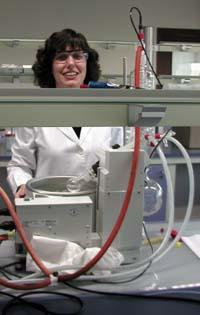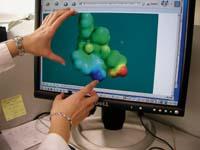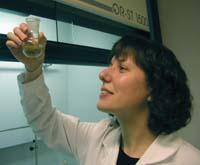Aizpea Zubia: "We imitate molecules of nature, but with the smallest ones"

In fact, he studied polymers chemistry in the career. In my fifth year project we were synthesizing polymers with special properties. The special properties of polymers were obtained by organic synthesis of special monomers and polymerization of them. I liked organic chemistry there. That is why I contacted the team of Fernando Cossio to carry out the doctoral thesis.
I think it gives a lot of play, although by definition it is very simple (chemical of structures that contain carbon, hydrogen, etc. ). For example, the quirality, asymmetry of interatomic bonds must be taken into account. These characteristics also appear in other types of chemistry, but are less common.
Well a little like cooking: mix the products, heat them, leave them for a while, see if the reaction progresses...
Yes. Well, getting into the field of pharmacology was a coincidence. A medical team asked us for a collaboration. There we started to design and synthesize the things they needed. We saw that we were doing quite well and that it was an interesting topic and we kept it.

On the one hand, because it has much to do with the basis of life, very important in all biological systems. And on the other hand, because it gives a lot of play also from basic science. Precisely, our research has focused on how to control or how to induce quirality back and forth. It is, in short, a challenge.
Yes, perhaps indirectly. The truth is that I now see the need to read more about molecular biology. And not only because of work, but because we do inhibitors, but also to satisfy my curiosity. My knowledge is limited in this area.
In recent years a huge effort has been made in this regard, but I believe that it still needs to be improved. Perhaps in society, people have many scientific issues around and don't realize it. You do not realize that you should know more or have more information.
A little yes. And this may be related to how chemistry is taught in secondary school. It begins directly with the nomenclature. It's like putting a dictionary in front of you to learn from memory. In addition, elsewhere it will be different, but here, in the Basque Country, industries such as machine tools have been much stronger. There were not many chemical industries, so people have little tendency to study chemistry. However, this is changing a lot.
As a company we do not work much basic research. We carry out applied research. This research is oriented to industrial developments, always in the field of organic chemistry, with molecules susceptible to being drugs.

Working in the university team, we had the opportunity to work with several biotechnology companies. One of its main needs was the formation of new molecules. It was usually part of the drug search programs. We realized that there we had a gap, but from the academic point of view it did not have so much interest. It was a different approach. So we thought, why not, that we could create a company to work in this field.
We try to imitate the molecules of nature, but with the smallest possible molecules for later use as drugs. The three-dimensional structure in which we have established positions in natural proteins allows us to obtain a geometry that adapts to this position by cyclic molecules. The cycle shape greatly determines the geometry of the molecule. Hence the general interest of cyclic molecules.
Yes, I don't know if it's for the laws of the market or why, but the vision has changed a little. Large multinationals have realized that they find it more profitable, rather than doing the whole process from the beginning, buying molecules or patents to those who have already done half of their work and seeing what both university groups and small businesses do. And companies like Ikerchem have here a txoko.
Yes and no. As far as I know, in our Autonomous Community the only one based on organic chemistry is ours. Others work in the field of drugs, but from a proteomic or other point of view. At the state level there are more similar companies but with their particularities. Enantia, for example, works hard with chiral molecules.
Our peculiarity is that we combine computational and synthetic chemistry. And it has happened… well, we have just started, but we know that in other cases two or three small companies have met to collaborate. Therefore, sometimes what can be competition becomes cooperation.

Yes, certainly; and being a small company more. An approach by multinationals is to take collections of compounds and carry out massive trials to find four or five molecules that work. We have no capacity to do so. Therefore, our approach is to analyze the biological system through the computer and perform a more targeted search.
Sometimes it seems that everything is already investigated and sometimes the opposite. We have now realized that microwave use has recovered many reactions that were halfway through. Some did not go well and others did not go well. But reactions work by microwave.
It is the same principle that uses the domestic microwave to heat the milk. Similarly, the reaction of several molecules can be achieved. There are industrial appliances to apply microwave radiation to science. The reaction, instead of heating, is started by microwave. Much XIX. They are reactions announced in the nineteenth century, which worked on paper but which in the laboratory did not manage to perform. Now they have achieved it using microwave. It is a new perspective.
It costs me a little, but I do many other things that have nothing to do with chemistry, I have many hobbies. In this profession there are people who have twenty-four hours thinking about work, it is not my case. But, for example, when I'm zapping on TV, if I find things about science, or technology, I see them at ease.
Buletina
Bidali zure helbide elektronikoa eta jaso asteroko buletina zure sarrera-ontzian








